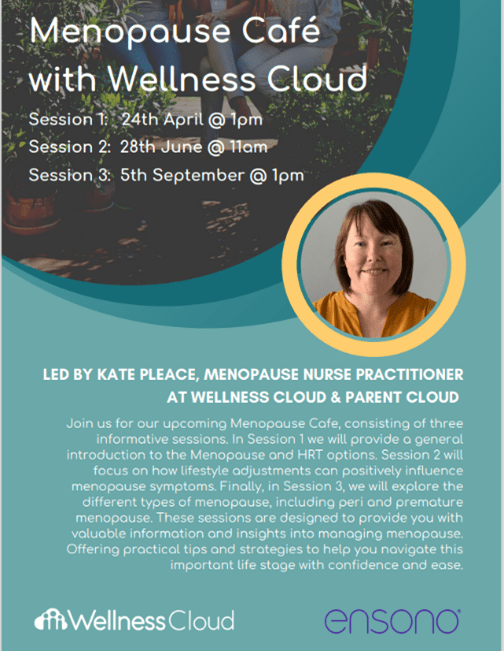The Other Tech Revolution: How Menopause Awareness and Support are Transforming the Workplace Experience

Claire Roberts
Sr. Proposal Manager
Editor’s note: In recognition of International Women’s Day, we’re shining a spotlight on the critical issue of menopause and its profound effects on women in the workplace. As you’re about to discover, it’s a topic that deserves the attention and understanding of all employees.
The conversation around diversity and inclusion has always been focused on helping people to be their authentic selves at work in order to generate better outcomes for employees and businesses. For female employees, supporting menopause—one of the most significant and often challenging events in a woman’s life—can play an important role in reaching that goal. Yet despite the universal nature of the experience and its impact on women’s work life, it remains a topic that people are reluctant or embarrassed to talk about, and organizations are largely failing to support.
Menopause—the permanent cessation of the menstrual cycle—is an event that occurs in the life of every woman, typically somewhere between the ages of 40-60. It is preceded by a roughly 5–10-year phase called perimenopause, during which hormone levels start to decline and many women experience a range of symptoms including hot flashes, psychological issues such as anger, irritability, anxiety, depression, memory and executive function changes, and sleep difficulties. It can be a stressful, confusing and isolating time, made more so by the fact that these symptoms cannot be compartmentalized and managed exclusively during “off-duty” hours:
- 73% of menopausal/perimenopausal women reported having hot flashes at work.
- 63% said they regularly felt tired or drowsy at work.
- 29% have lost self-confidence because of memory difficulties.
These statistics1 make it clear that menopause is not just a gender or age issue; it is an organizational issue which can affect colleagues both directly and indirectly. Despite this, 90% of women say their workplaces offer NO help for menopausal women workers. Of the firms that do offer support, 5% offer free advice, 3% have policies in place and 3% of line managers are given relevant training.
A recent BBC article2 cites the Equality and Human Rights Commission’s (EHRC) view that menopause symptoms could be considered a disability under the Equality Act 2010 if they have a long-term and substantial impact on a woman’s ability to carry out their usual day-to-day activities.
The EHRC’s resources aim to raise awareness about menopause and promote a more inclusive and understanding workplace environment. They have issued new guidance and a video to help employers understand their legal obligations under the Equality Act 2010, which include making reasonable adjustments for employees experiencing menopause symptoms.
This is a crucial step towards ensuring that women going through menopause receive the support they need at work. Amongst the research results cited in the article, is the shocking finding that one in 10 women surveyed who worked during their menopause were forced to leave their job due to symptoms, and the fact that many women do not feel comfortable requesting adjustments or support from their employers — all of which underscores the importance of these measures.
We can and must do better. Thankfully, we’re starting to.
Changing the conversation by turning up the volume (and the money)
The good news is the world finally seems to be accepting that menopause is a significant, universally relevant topic that needs to be addressed. As just one example of this shift, the pharmaceutical company Astellas spent $24 million on television ads for their menopausal drug Veozah during the U.S. NFL 2023 season, including a 60-second spot during the Superbowl itself, one of the largest stages in the world with an incredibly engaged audience that is far from exclusively female3. We are starting to talk about it out loud, not just in whispers, and the tech industry and workplaces are starting to explore what they can do to support women during this phase.
Further evidence of changing attitudes is the tech industry’s growing investment in FemTech/MenoTech— products and services designed to address female health and wellbeing issues, including menopause and perimenopause. It’s early days, but some incredibly interesting solutions have already emerged or are on the horizon, including:
- Innovative devices that can alleviate the common menopause symptom of hot flashes. The Embr Wave bracelet, for example, uses patented technology to cool a user’s wrist on demand, while the Grace bracelet, currently under development, will be able to pre-empt a hot flash, cooling the wrist before the hot flash even begins.
- Digital services such as Stella and Alva that offer consultations, specialist advice, even a virtual menopause coach, and doorstep delivery of treatments.
- Clothing solutions like Become, which provides patented clothing that cools the skin, evaporates sweat away, releases heat back to the body, and reduces odour, providing another solution for tackling hot flashes.
The market for these solutions is predicted to be worth $60B by 2027, so this is likely just the start of developing technology to address the plethora of symptoms women suffer during this time. As is so often the case, what’s good for employees is also good for the bottom line.
FemTech evangelists Karina Vazirova and Katia Lang4, the team behind the female health and wellness accelerator FemTech Lab, agree. “Women are more than half the population, yet we have unmet needs,” says Vazirova. “Many products aren’t designed for women, and many clinical trials favour men.” She notes that with 1.2 billion women worldwide estimated to be menopausal or postmenopausal by 2030 and almost no one happy with the care currently on offer, there is “a massive opportunity to provide better products and services. It has so much potential.”
Ensono: Leading the way
At Ensono, we believe our greatest asset is our people. Our DEI commitment states, “We want associates to bring their best to work every day – that means creating an equitable and inclusive workplace for everyone to show up authentically.” Ensono is absolutely committed to supporting the health and wellbeing of all our associates.
With that in mind, in 2023 we held a series of informal meetings in our U.K. offices called the “Menopause Café”: a safe space for women of all ages to discuss the subject and ask questions. In collaboration with a specialist from Parent Cloud, these sessions provided female associates with clear, impartial advice and information. They were well attended by female associates of ages ranging from late 20s to late 50s and received unanimously positive feedback:

“The menopause café was a real eye opener for me! I knew very little about peri or menopause and frankly didn’t want to think about it. Talking with other women and hearing their coping strategies was so helpful and gave me ideas for further research on how to look after myself and others going through the process.” — Emma Fenwick, Manager, CPE Business Partner
“Being given the opportunity to discuss with colleagues the physical and mental challenges menopause brings in a safe environment with the support of an expert was invaluable. Hearing others speak openly about their experiences was enlightening and has more than helped me to understand what support is available. I hope there will be more sessions in the future.” — Charlotte Stamp, Client Engagement Partner, Renewals Specialist
“I can’t tell you know much I valued this café. It was eye-opening and super-refreshing to hear other people raise issues and talk about their journey.” — Anonymous
“I just wanted to say I found the Menopause café a really useful and insightful forum to discuss a really important topic on women’s health. I have been experiencing a number of symptoms that I wasn’t sure were all related to the perimenopause but now, on hearing the honest accounts shared by my lovely colleagues, I know they likely are and it’s something I can get help for and not continue to suffer my way through.” — Anonymous
On the back of the success of the Menopause Café, Ensono will be continuing these sessions on a quarterly basis. Additionally, we will be providing all associates access to a Menopause toolkit including a Menopause guide, to provide guidance and direction to both associates and managers who are not sure where to turn.
Be part of the Menopause Revolution!
Removing the silence and stigma around menopause and putting it squarely on the DEI agenda should be a top priority for every organization that wants to foster a truly inclusive environment for all employees, at all times. With open dialogue, accessible education and active support, you can be the “relentless ally” that helps your female team members, and those who work with, depend on and care about them, to consistently thrive.
References:
1Menopause Statistics and Trends for 2022/23 | Vitality Pro (vitality-pro.com)
2Firms must help menopausal workers, or face being sued – BBC News
3 https://www.forbes.com/sites/joshuacohen/2024/02/12/menopausal-drug-veozah-features-prominently-among-superbowl-ads/?sh=20f9b11724ca4From menopause to anxiety: the new tech tackling women’s health problems | Health & wellbeing | The Guardian
Social Share
Don't miss the latest from Ensono
Keep up with Ensono
Innovation never stops, and we support you at every stage. From infrastructure-as-a-service advances to upcoming webinars, explore our news here.
Blog Post | June 3, 2025 | Industry trends
From Data Center Exit to AI-Ready Cloud: Lessons from the Field
Blog Post | April 16, 2025 | Industry trends
Closing the Cloud Skills Gap with Engineering Talent that Flexes with You
Blog Post | April 8, 2025 | Technology trends